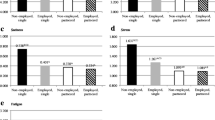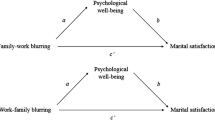Abstract
Perceptions of married parents were investigatedas a function of their gender, and the employment statusof both the parent and her or his spouse following theirchild's birth. College students (91 percent White, 9 percent African American, AsianAmerican and Hispanic) evaluated a briefly describedmarried employed parent on 31 7-point bipolar scalesthat described nurturance behaviors, job performancecharacteristics and stress/overload variables. Each evaluatorrated 1 of 8 parents portrayed as either a mother or afather who, following their infant's birth, eitherworked full-time or reduced her/his work hours, and whose spouse either worked full time or reducedhis/her work hours. Full-time employment, compared topart time employment, (1) enhanced perceptions of theprofessional competence of fathers, but not mothers; and (2)lowered evaluations of nurturance forboth parents, but especially for mothers. Mothers wereperceived as under more stress than fathers.
Similar content being viewed by others
REFERENCES
Biernat, M., & Wortman, C. B. (1991). Sharing of home responsibilities between professionally employed women and their husbands. Journal of Personality and Social Psychology, 60, 844–860.
Bridges, J. S., & Etaugh, C. (1994). Black and white college women's perceptions of early maternal employment. Psychology of Women Quarterly, 18, 427–431.
Bridges, J. S., & Etaugh, C. (1995). College students' perceptions of mothers: Effects of maternal employment-childrearing pattern and motive for employment. Sex Roles, 32, 735–751.
Bridges, J. S., & Orza, A. M. (1992). The effects of employment role and motive for employment on the perceptions of mothers. Sex Roles, 27, 331–343.
Bridges, J. S., & Orza, A. M. (1993). Effects of maternal employment-childrearing pattern on college students' perceptions of a mother and her child. Psychology of Women Quarterly, 17, 103–117.
Buss, D. M. (1981). Sex differences in the evaluation and performance of dominant acts. Journal of Personality and Social Psychology, 40, 147–154.
Cohen, J., & Cohen, P. (1975). Applied multiple regression/correlation analysis for the behavioral sciences. Hillsdale, NJ: Erlbaum.
Crosby, F. J. (1991). Juggling. New York: Free Press.
Eagly, A. H., & Steffen, V. J. (1986). Gender stereotypes, occupational roles, and beliefs about part-time employees. Psychology of Women Quarterly, 10, 242–262.
Etaugh, C., & Nekolny, K. (1990). Effects of employment status and marital status on perceptions of mothers. Sex Roles, 23, 273–280.
Etaugh, C., & Poertner, P. (1991). Effects of occupational prestige, employment status, and marital status on perceptions of mothers. Sex Roles, 24, 345–353.
Etaugh, C., & Poertner, P. (1992). Perceptions of women: Influence of performance, marital and parental variables. Sex Roles, 26, 311–321.
Etaugh, C., & Spinner, M. (1991). Perceptions of caregivers of elderly parents by college students: Effects of caregiver gender, type of care and presence of children. Journal of Women and Aging, 3, 37–52.
Etaugh, C., & Study, G. G. (1989). Perceptions of mothers: Effects of employment status, marital status and age of child. Sex Roles, 20, 59–70.
Gunter, N. C., & Gunter, B. G. (1990). Domestic division of labor among working couples: Does androgyny make a difference. Psychology of Women Quarterly, 14, 355–370.
Gutek, B. A., Repetti, R. L., & Silver, D. L. (1988). Nonwork roles and stress at work. In C. L. Cooper & R. Payne (Eds.). Causes, coping and consequences of stress at work. New York: Wiley.
Jackson, L. A., & Cash, T. F. (1985). Components of gender stereotypes: Their implications for inferences on stereotypic and nonstereotypic dimensions. Personality and Social Psychology Bulletin, 11, 326–344.
Jackson, L. A., & Sullivan, L. A. (1989, August). Perceptions of multiple role participants: Implications for the structure of gender stereotypes. Paper presented at the meeting of the American Psychological Association, New Orleans, LA.
Nunnally, J. (1967). Psychometric theory. New York: McGraw-Hill.
Nyquist, L., & Spence, J. T. (1984, August). Effects of personality and sex-role expectations on leadership choice and task behaviors. Paper presented at the meeting of the American Psychological Association, Toronto, Ontario, Canada.
Pittman, J. F., & Kerpelman, J. L. (1993). Family work of husbands and fathers in dual-earner marriages. In J. Frankel (Ed.), The employed mother and the family context. New York: Springer.
Pleck, J. H. (1993). Are “family supportive” employer policies relevant to men? In J. C. Hood (Ed.), Work, family and masculinities. Beverly Hills, CA: Sage.
Rosenwasser, S. M., Gonzales, M. H., & Adams, V. (1985). Perceptions of a housespouse: The effects of sex, economic productivity, and subject background variables. Psychology of Women Quarterly, 9, 258–264.
Russo, N. F. (1976). The motherhood mandate. Journal of Social Forces, 32, 143–154.
Silverstein, L. B. (1996). Fathering is a feminist issue. Psychology of Women Quarterly, 20, 3–37.
White, M. J., Kruczek, T. A., Brown, M. T., & White, G. B. (1989, May). Occupational sex stereotypes among college students. Paper presented at the meeting of the Midwestern Psychological Association, Chicago.
Rights and permissions
About this article
Cite this article
Etaugh, C., Folger, D. Perceptions of Parents Whose Work and Parenting Behaviors Deviate from Role Expectations. Sex Roles 39, 215–223 (1998). https://doi.org/10.1023/A:1018850404838
Issue Date:
DOI: https://doi.org/10.1023/A:1018850404838




